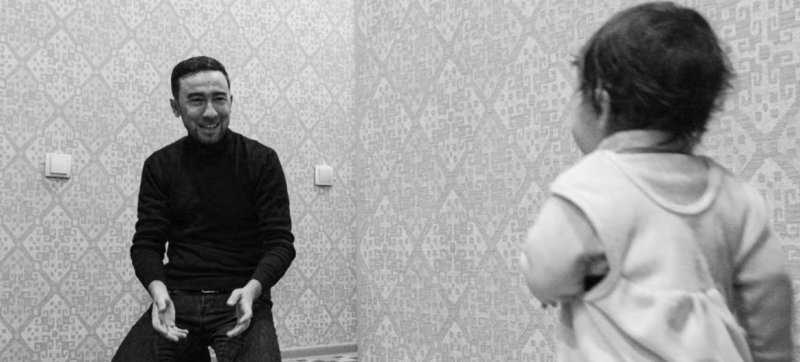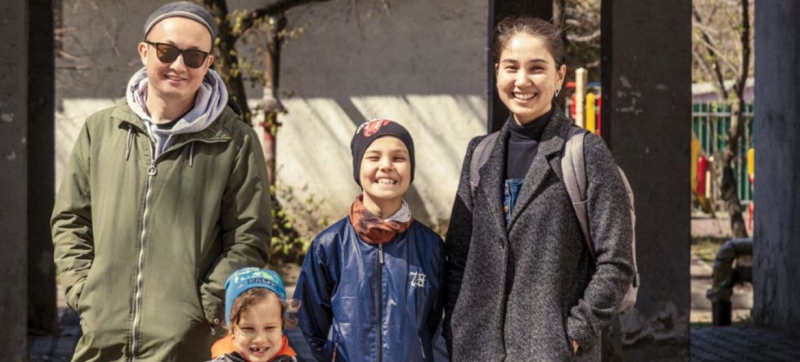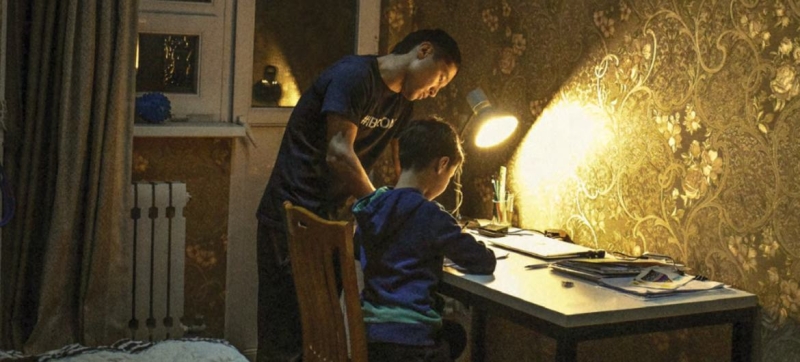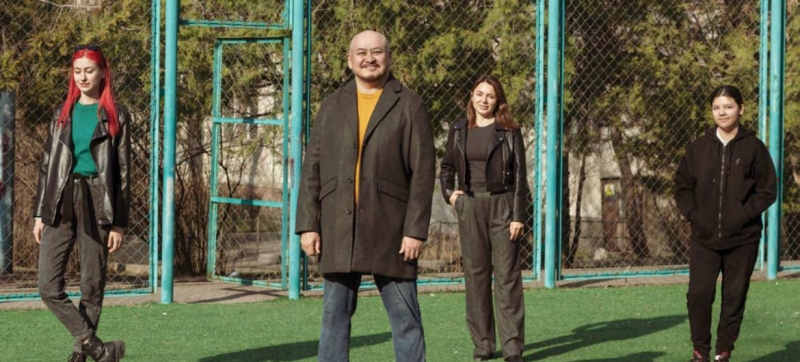
Akhmadzhon Ruziboev with his daughter. PLOT | “Good power”: how the behavior patterns of men in Central Asia are changing Culture and education
“My attitude towards fatherhood changed when I turned 30 years old. Not because I had a child, but because my sister had one. She and her family live outside of Kazakhstan, and we don’t often get to spend time together, but every time we do, I watch my son-in-law and my nephews with great surprise. I watch with amazement, joy and a bit of envy.”
Madi Mambetov’s parents divorced when he was little. He eventually developed a good relationship with his father, who did not take an active part in his upbringing, but he still cannot resist making comparisons: “My mother taught me to swim. My nephews are their father. My friends taught me to ride a bike when I was 14 years old. My brother-in-law taught his children to ride a bicycle when they were three years old. He teaches them to ski, takes them on mountain biking trips in the Swiss foothills where they live, monitors their progress at school, cooks them sushi and pies, and teaches them to cook for themselves.”
From “absent” dads to happy dads
Madi Mambetov is one of the authors of the book “Being a Man in Central Asia,” prepared with the support of the Ray of Light initiative and commissioned by the United Nations Population Fund (UNFPA). He grew up in late-Soviet Kazakhstan, when models of masculinity and fatherhood were very different.
The most common type of father was the “absent” father, who is focused on work, is rarely at home and distances himself from the children, thus maintaining his “authority” and actively expressing himself as a parent he is only in those cases when children need to be disciplined and punished.
“We live in an extremely interesting era, when a lot is changing, and changing very quickly… Ten years ago I was amazed by the example of the father of my nephews, but now I am seeing similar examples in Kazakhstan, around me, among my peers and men younger than me. And every time it brings me jubilant joy. I see young men suddenly discovering the joy that fatherhood gives them. Parenthood is the hardest, most complex work possible, but it can be not a burden, but a great happiness,” says Mambetov.
“We see young fathers on playgrounds playing with their children. We see fathers who are able to braid their daughters’ hair and participate in their experiments with cosmetics. We see outwardly stern men who hug their crying sons, whisper kind words to them and stroke their unruly hair, consoling them. I see men who are able to feed their children themselves, bathe them, and treat a wound. Who can immediately come up with a new fairy tale for children, putting them to bed. And I’m happy for them because I see that they are happy themselves and raising happy children,” he continues.
How to raise a child whose identity you don’t know
The book tells the stories of several fathers from Central Asian countries in the first person. And each of them debunks myths about fatherhood and motherhood, about the traditional roles of men and women in the family, about the distribution of responsibilities at home.
Adil Nurmakov from Kazakhstan – candidate of political sciences, teacher, publicist, blogger. His wife, Zarina Nurmukhambetova, is a communications specialist who has worked for organizations such as UNICEF and the World Bank. In the first months of pregnancy, Zarina was worried about her future: in the Central Asian region, the birth of a child often means at least a long pause in her career.
But the more she thought about what kind of father her husband would be, the more confident and calm she looked at her prospects. Adil has always been an excellent partner for her: he honestly did his share of the housework, cooked well, respected Zarina’s ambition and supported any of her career endeavors.
“With the advent baby, I didn’t know how our relationship would change. It turned out that my husband copes better with the child than I do. The baby falls asleep better in his arms, he was the first to start walking with him, and at the sound of his voice he begins to be so happy that my heart melts,” says Zarina.

Adil Nurmakov, Zarina Nurmukhambetova and their sons.
According to Adil, he did not imagine that he would become such an actively involved father in the lives of his children. At some point, he even thought that he would not start a family, and he got married – by the standards of the region – quite late, at 34 years old. But with the birth of his eldest son, his views changed. Adil, having been involved in Minar’s care literally from his birth, could no longer tear himself away from him. Five years later, the couple’s second son, Alan, was born. Now Nurmakov enjoys communicating with his children, together they look forward to their mother while she goes on business trips.
“Many men think that in the first years of life, a child needs a mother most of all, and the father can get involved later, when it is necessary to educate, strengthen character, “teach life.” But the most rapid mental development of a child occurs in the first three years of life, when the future individuality is formed. How to “raise” a child whose identity you don’t fully know?,” says Adil.
There are more and more involved and active fathers today – even in countries where traditional, patriarchal views on family, raising children and the roles of men and women in society prevail. In Central Asia, this trend is still in its infancy. According to UNICEF, only 6 percent of fathers in Kazakhstan are involved in the development of the child.
“Every child needs protection, understanding, love. Men often limit their role to the first task. But protection in early childhood is protection from the unknown, from the surprises of the outside world, from the child’s inability to manage his emotions and analyze his well-being. Your weapon here is attention, tenderness and care, which should come not only from mothers, but also from fathers,” says Adil.
Help your wife in everything, like a Prophet
Cardiologist from Uzbekistan Akhmadjon Ruziboev is the father of a one-year-old girl. As a doctor, he was very responsible about the pregnancy of his wife Nargiza and tried to provide her with maximum comfort. Closer to the birth of his daughter, Ahmadjon took a vacation because he knew how important it was to support his wife during this period. After his daughter was born, he was at home for another two weeks and actively helped his wife care for her.
“I would like for men in our country to also be given paid parental leave,” says Ahmadjon.
After the birth of the child, Nargiza developed postpartum depression. And Ahmadjon, who perfectly understood how serious this problem was, tried to support his wife in every possible way, took on a significant part of the responsibilities for caring for the baby and gave his wife the opportunity to relax and take care of herself.
“ I know how hard it is to raise a child. Every day I spend at least 3-4 hours with my daughter, and on weekends – almost the whole day. Therefore, I understand what a lot of work it is. I get more tired in two hours with my child than in a whole day at work. But don’t think I’m complaining. Seeing her laugh, hearing her say “daddy” is the most precious thing. At such moments, I forget that I’m tired after work,” says the man.
Akhmadjon is a deeply religious person who believes that most common stereotypes about gender roles are not have nothing to do with Islam. Thus, Islam encourages people to help each other.
“I try to help my wife in everything, just like our Prophet. Many men believe that a woman’s place is in the kitchen, but I don’t agree with this. This is a stereotype that interferes with happy family relationships,” says Ahmadjon.
He is also outraged by the desire of some men to have only sons: “I have a very negative attitude towards this. I know that all children are from God.”

Nurshat Abakirov with his son.
“I always knew that I needed a strong woman”
The communications coordinator for the UN system in Kyrgyzstan, Nurshat Abakirov, met his future wife, an employee of the International Committee of the Red Cross, Nadira Mirzalieva, at the university. Nurshat lost his mother early, spent part of his childhood in a boarding school, and Nadira grew up in a large family. Both are used to relying on themselves for everything. Today the couple has a 10-year-old son and a six-year-old daughter. Parents try to instill in them independence, perseverance, hard work and determination.
“My mother was a strong person, a leader. He comes from a mountain Uzgen family, from a family of nomad hunters. In her family, women spoke openly. Dad comes from a settled farming community in Nookat, which is more traditional in that women stay at home and cook. At the same time, dad always appreciated and respected a strong woman in mom,” says Nurshat.
“When in childhood we were faced with a choice: to go to Nukay or Uzgen, we chose Uzgen. Because there we were the children of a daughter, who were emphatically respected, we always rode horses, there were more privileges. They told us: you are the children of Arzakan, the good in you is the foundation laid by your mother… I always knew that I needed a strong woman, and I chose my wife accordingly. When I graduated from university, she was already working and studying for a master’s degree. But that didn’t stop me,” he adds.
After the birth of his first child, Nurshat, who had accumulated a lot of vacation time, managed to agree on a part-time working day – he worked half a day after lunch, and at night he was on duty with the child along with his wife .
A sought-after specialist, Nadira returned to work six months after the birth of her first child and began going on business trips. During this period, the Abakirovs already had a nanny. But when Nurshat returned home in the evening, he took full charge of caring for the child: “When you are fully involved, you build very good relationships with children. It is important that the father shares responsibility with the mother.”

Erden Telemisov and his family.
Kazakh actor Erden Telemisov, who gained international fame thanks to his role in the British TV series Slow Horses, also always knew that he needed a strong woman. “Having a strong woman next to you means being a strong man,” he says.
“We never fight, every few months we can say something to each other in a raised voice. But we learned to say things that we like or don’t like,” Telemisov says about his relationship with his wife Natalya.
Erden has three daughters, and has good, close relationships with all of them. For Erden, it is important to show children what a man can be: caring, attentive, gentle and sensitive. So, he believes, in the future they will be able to find worthy partners and build happy relationships with them.
“Knowing what a man should be, they themselves will choose worthy partners for themselves. It is very important to me that children are not afraid of me. It is important that my girls know that aggression is unacceptable, so that any manifestation of domestic violence is shocking for them. So that if something like this happens, they get up, slam the door and leave,” says Erden. – It is unacceptable for any living person, regardless of man or woman, to raise a hand against another. Only if it’s not self-defense. A man is a good force. This is how it should be.”
Read also:
